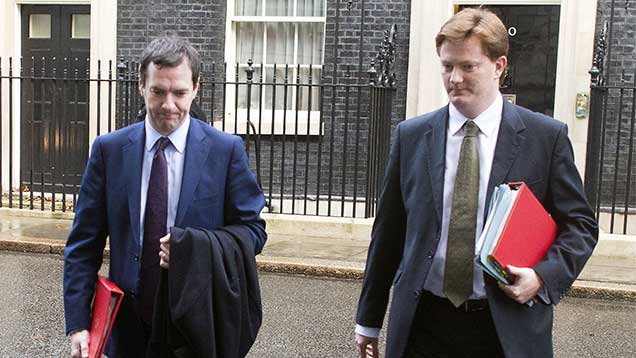12 autumn statement changes farmers need to know
 © Rex
© Rex George Osborne’s autumn statement contained several measures that will give a boost to farms and farming families.
The chancellor’s upbeat mood at Westminster contrasted a more lukewarm outlook for the economy in the next five years.
But tax tweaks, extensions to business rate relief and commitments to review old rules might offer the agricultural community some optimism.
Farmers Weekly highlighted the key points for farmers from the government’s announcement.
1. Income tax eased. The chancellor upped the planned increase in the tax-free personal allowance from April 2015. Rather than the threshold rising to £10,500 next year, it will increase to £10,600. The threshold for the higher 40% rate will also rise by £500 to £42,385.
2. Freeze on fuel. The duty on petrol and diesel will stay the same until May next year. Falling crude oil prices reaching the forecourt should bring an extra boost by lowering costs for farming families.
3. Apprentice aid. Firms employing apprentices aged under 25 will not have to pay national insurance contributions for those workers. Last year the government announced employers would not have to pay contributions staff under 21.
4. Stamp duty overhaul. The headline change from the chancellor was to switch old slab structure to a marginal rate system, a bit like income tax. Within each tax band, buyers will have to pay that rate of tax on the part of the property price inside it. Farms usually qualify as non-residential and mixed-use, meaning the rate is capped at 4% for properties worth more than £500,000. But sellers of smaller lifestyle farms or estates might have to think how sales are structured.
5. Loans for extra study. From 2016 under 30s will have access to £10,000 loans for taking taught postgraduate degrees. All the agricultural departments at universities offer further courses beyond a bachelor’s to help deepen farming knowledge.
6. Holiday help. Farming families who manage to escape for a foreign break might find it cheaper. Children under 12 will be exempt from tax on economy flights from May 2015 and the age will rise to 16 the year after.
7. Diversification boosted. Small businesses will see their rate relief jump from £1,000 to £1,500 from April 2015 to March 2016. The annual increase in business rates will also be capped at 2% over the same period. This could help farms with diversifications such as shops or restaurants.
8. Flood protection. In the run up to the statement, the government announced a £2.3bn investment in protecting homes from flooding over the next six years. In his speech the chancellor said the government would bring in tax relief for businesses looking to invest in flood defences themselves.
9. Right to buy. Compulsory purchase law, that allows authorities to acquire land in return for compensation, will be reviewed. The statement said proposals for streamlining and updating the system will be published at the budget in the spring to make the process “clearer, faster and fairer”.
10. Savings help. Pensioners’ widows and widowers could be helped by changes to ISA rules that will transfer the deceased’s ISA tax advantages to their surviving spouse or civil partner. Also, beneficiaries of those who die before reaching 75 with an annuity will receive any payments tax free.
11. Tough years to come. How fast the economy is growing has a strong link to demand for food and the confidence of businesses to invest for the future. The Office for Budget Responsibility (OBR) predicted the UK to grow by 3% this year, but expects that to dip to 2.2-2.4% over the next four.
12. The cost to borrow. A rise in interest rates would have a big financial impact on farms carrying debt. The decision to raise them from 0.5% belongs to the Bank of England, not the chancellor. But yesterday he revealed that the OBR expected inflation to fall from 1.7% this year to 1.2% in 2015. With prices suppressed, it will be hard for the bank to choke off cheaper access to cash by upping rates next year.
See also: Some boosts for farm business in chancellor’s autumn statement
